Protein powders have come a long way in recent decades, which means there are more choices than ever when you’re searching for the best protein powders. Truvani Organic Plant-Based Protein Powder is one of the many options on the shelf, and it’s bound to catch your eye if you’re a plant-based eater. Unlike many vegan protein powders that are formulated around soy protein, Truvani Protein Powder is soy-free and utilizes other plant-based proteins.
In this Truvani Protein Powder review, our product tester provides first-hand experience from using the product, while I weigh in on the formulation as a registered dietitian alongside another of BarBend’s expert reviewers, also an RD. We’ve tested more than 100 protein powders with our supplement testing methodology, which guides us as we rate important aspects like taste, formulation, third-party testing, and more — every time. We think Truvani is a great option for vegan athletes who want a lot of flavor variety and certified organic ingredients. Read on for the details.
Editor’s note: The content on BarBend is meant to be informative in nature, but it should not be taken as medical advice. The opinions and articles on this site are not intended for use as diagnosis, prevention, and/or treatment of health problems. It’s always a good idea to talk to your doctor before beginning a new fitness, nutritional, and/or supplement routine. Individual needs for vitamins and minerals will vary.
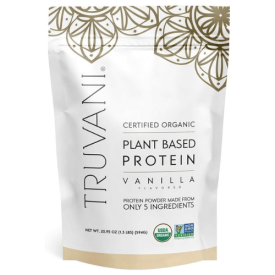
Truvani Protein Powder packs in 20 grams of protein per serving and is made from just five simple ingredients. This plant-based protein powder is also certified USDA Organic, non-GMO, and vegan-friendly.
Main Takeaways
- Truvani plant-based protein powder is certified organic, vegan-friendly, and free of artificial sweeteners and soy. It also is made from non-GMO ingredients.
- Compared to other competitors, Truvani is more expensive but also has more flavor options.
- The biggest drawback to Truvani Protein Powder is the cost at $3 per serving.
Truvani Protein Powder Specs
| Price Per Serving: | $3 |
| Protein Per Serving: | 20g (Chocolate Peanut Butter=21g) |
| Key Ingredients: | Organic Pea Protein, Organic Pumpkin Seed, Chia Seed Protein, Organic Monk Fruit Extract |
| Calories Per Serving: | 100-150 (depending on flavor) |
| Flavors: | Chocolate, Vanilla, Banana Cinnamon, Chocolate Peanut Butter, Vanilla Chai, Peanut Butter, Unflavored/Unsweetened, Matcha, Lemon Cookie |
| Third-Party Tested? | Yes |
Outside the sea of the best vegan protein powders, you might find fillers, artificial sweeteners, and long ingredient lists. It can be hard to find a simple vegan protein powder. Truvani fits the bill with its simple ingredients and use of USDA organic, non-GMO ingredients.
BarBend’s expert tester and fellow registered dietitian Chelsea Rae Bourgeois, MS, RDN, LD, says of this product: “Truvani’s Plant-Based Protein Powder contains just 3 to 7 ingredients, with minimal, if any, added sugars. It’s a lean protein powder for those who follow a plant-based diet.”

Rosie Borchert, our product tester and member of BarBend’s editorial team, sums up her overall experience using Truvani Protein Powder, saying: “I was really impressed with the flavor, and am looking forward to having this in the morning. This isn’t my favorite protein powder, but I’d say it’s maybe top five. Still, for the price, there’s no way I’d buy this again. There are 20 servings in a bag that cost about 60 bucks!”
Who Should Use / Who Shouldn’t Use Truvani Protein Powder
Protein powders are a convenient way to add protein to help meet your protein needs (you can figure that out using BarBend’s protein intake calculator.) In addition to eating high-protein foods, protein powders can be added to your favorite drinks — all you need is a shaker bottle!
Whether you’re looking for muscle gain or simply want a protein supplement to help make you feel more full throughout the day, Truvani Protein Powder can be a good fit for nearly anyone.
Recommended for:
- People who want a convenient way to add protein to their diet.
- Protein powder users who avoid dairy, soy, or artificial sweeteners.
- People on special diets like low-carb/keto and paleo.
Not Recommended for:
- Those who need to limit their protein intake for health reasons, e.g. kidney or liver issues.
- People with allergies or sensitivities to peas, pumpkin seeds, or chia seeds.
- Those who don’t necessarily need a vegan/plant-based protein powder and are okay with using whey (many of which are cheaper than this powder.)
Our Experience Using Truvani Protein Powder
Whether you’re working to build muscle through strength training, recover from long-distance runs, or are simply trying to incorporate more high-protein, low-calorie foods to support weight loss, Truvani may work well for you.
Our product testers give Truvani Protein Powder a 4 out of 5 for flavor and 4.5 out of 5 for solubility — both respectable scores. Given our experience, we’d suggest mixing Truvani Protein Powder with milk or a smoothie for the best texture.
Ingredients and Formulation
This powder comes with a blend of different protein sources. According to registered dietitian Chelsea Rae Bourgeois: “I like that each serving provides 20 grams of USDA organic protein. And while the other macros will vary between flavors, all the options are fairly lean. Those who need to boost their protein intake without skewing their other macronutrients may like this type of protein powder.”
Overall, Bourgeois rates this formulation a 4.5 out of 5, high praise from a registered dietitian. She says: “This protein powder offers a good balance of macronutrients and boasts an impressively lean ingredients list. The deductions stem from its sodium content, which may be a deterrent for some.”
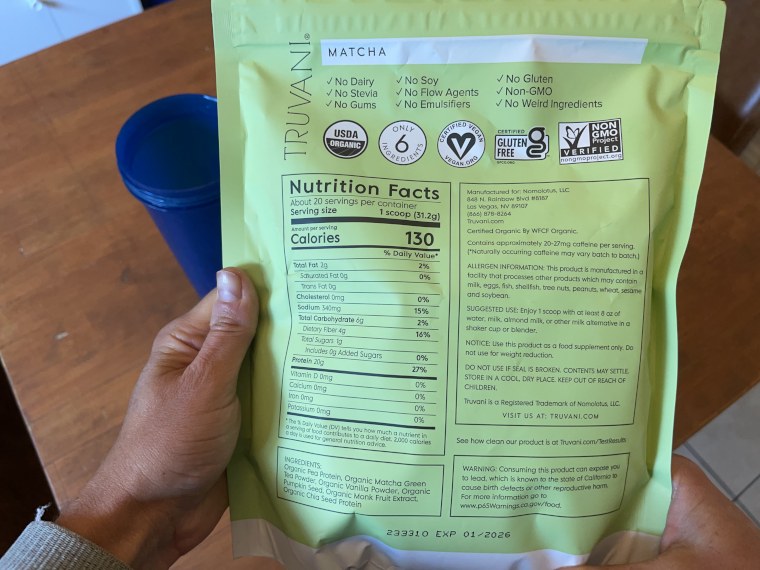
As an RD, I’ll break down the specific ingredients for you here.
Organic Pea Protein
When comparing pea protein versus whey protein, the main difference is that pea protein comes from high-protein vegetables instead of an animal source. While whey protein comes from cow’s milk, pea protein powder is from yellow and green split peas, making it a common ingredient in vegan protein powders.
Whey protein powders are considered some of the best protein powders for muscle gain — so how does pea protein stack up? According to a small study of men and women taking pea or whey protein during eight weeks of high-intensity functional training, “whey and pea proteins promote similar strength, performance, body composition, and muscular adaptations.” (1)
Foods like peas are considered to be complete proteins, which means they contain all of the essential amino acids your body can’t make on its own. (2) Similar to whey, pea protein can either be a concentrate or an isolate — the latter being higher in protein by weight. (Truvani doesn’t specify if the pea protein they use is a concentrate or isolate.)
Truvani Protein Powder is dairy-free, so it’s suitable if you have a milk allergy or intolerance. Truvani Protein Powder sets itself apart from other vegan protein powders since it’s soy-free, so it’s a great choice if you have a soy allergy or are avoiding soy for any reason. (Soy is perhaps the most common vegan protein source, so it’s in a lot of vegan products.)
Organic Pumpkin Seed
Along with pea protein, pumpkin seed is one of the main sources of plant-based protein in Truvani’s protein powder. Pumpkin seeds are one of the richest plant-based sources of iron. According to the United States Department of Agriculture’s nutrient database, a single cup of pumpkin seeds provides around 11% of the daily value for iron.
In addition to iron, pumpkin seeds are rich in healthy unsaturated fats. Studies have consistently suggested that diets rich in plant-based foods like nuts and seeds are associated with healthier blood pressure, cholesterol, and blood sugar levels. (3)
Organic Chia Seed Seed Protein
You’ve probably heard of the health benefits of omega-3 fatty acids before. Omega-3 fatty acids are a specific type of dietary fat that comes with a slew of potential health benefits, including the ability to fight inflammation. (4)
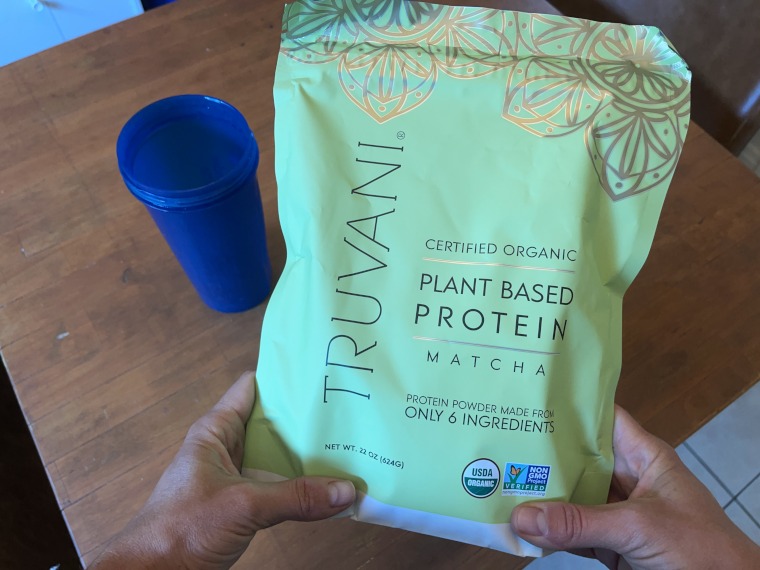
Considering a typical American diet is higher in omega-6 fats (which tend to be more pro-inflammatory) than omega-3’s, it’s important to consume foods like chia seeds, which are one of the richest plant-based sources of omega-3’s you can get.
More specifically, chia seeds have proven heart health benefits like reducing blood pressure, lowering cholesterol, and helping platelets not stick together, which may help lower your risk of serious health issues like heart attack and stroke. (5)
Organic Vanilla Powder
All of the flavors of Truvani’s protein powder (except the unflavored version) contain vanilla powder as a flavor enhancer. Vanilla powder helps provide a more intense vanilla flavor since it’s made from vanilla beans, yet it’s not a source of sugar.
Organic Monk Fruit Extract
Other than the unflavored/unsweetened version, all of Truvani’s flavors contain monk fruit extract as a sweetener. Monk fruit extract is considered a natural non-nutritive sweetener and is a good option if you’re avoiding artificial sweeteners.
Some of the best-tasting protein powders we’ve tested use sweeteners like monk fruit extract along with stevia. Both of these sweeteners are considered paleo-friendly, and they’re also suitable for low-carb diets such as keto.
Other Ingredients
All of the flavors of Truvani Protein powder contain the protein blend (pea protein, pumpkin seed, chia seed) and monk fruit sweetener — the exception is the unflavored version, which doesn’t contain vanilla powder or monk fruit sweetener. Depending on the flavor you choose, there are other ingredients on the ingredients list besides the protein blend including:
- Lemon extract (Lemon Cookie flavor)
- Matcha green tea (Matcha flavor)
- MCT oil (Lemon Cookie flavor only): MCT oil is made from medium-chain triglycerides, a type of fat that might help with weight loss, according to some studies. (6)
- Organic alkalized cocoa
- Organic banana powder (Banana Cinnamon flavor)
- Organic peanut flour (dried and ground peanuts and not actual flour, so it’s still gluten-free!)
- Organic spices (ginger, cinnamon, nutmeg, allspice, etc.)
Taste
With all of the flavor options Truvani offers, our BarBend product tester and editorial team member Rosie Borchert has a lot of input regarding its taste. In terms of a score for taste: “Taste gets a 4 out of 5. The first half of my drink was heaven, but I got a little tired of the flavor by the end of it.”

The flavor she used was Matcha and, she had this to say about the experience: “A long time ago, I had a friend who would make me matcha lattes in the morning. I don’t drink caffeine anymore, but this matcha-flavored protein shake is going to be an awesome way to start my day.”
When it comes to using the protein powder mixed with milk versus water, Borchert notes that it is better with a milk product if you want something creamy. “I mixed this with water and some soy milk, and I preferred the taste of it when mixed with the soy milk. It mixes well with both, but some sort of milk or milk-like product adds to the creaminess you want from a matcha.”
Reviewers on Truvani’s website reflect positively on the chocolate flavor, so if you’re not a big matcha fan you might have good luck with chocolate or vanilla. If you don’t want to mess with the flavors and want to go for the unsweetened version (similar to popular collagen powders), then that’s also an option Truvani offers.
Remember that the flavors often aren’t just about taste, though. Bourgeois points out that the different formulas for different flavors can mean a variety of nutritional content: “Some of the flavors provide a significant portion of your day’s recommended sodium intake. For example, the chocolate peanut butter flavor contains 330 mg of sodium per scoop, which is 14% of the Daily Value. If you’re monitoring your sodium consumption, be sure to read the nutrition labels on this product to avoid exceeding your recommended intake.”
[Read More: Best Whey Protein Powders]
Solubility
The ingredients and flavor of protein powder can be on point, but that doesn’t mean much if it doesn’t mix into your favorite beverages very easily. Protein powders usually mix the best into things like milk or smoothies, but you can use plain water as well. If you want a uniform, smooth result, you’ll get the best results using a shaker bottle or an actual blender.
Our product tester, BarBend editorial team member Rosie Borchert, gives Truvani Protein Powder a 4.5 out of 5 for solubility, noting that this protein “Mixes fine with water, but definitely tastes better with milk or a milk-alternative.”
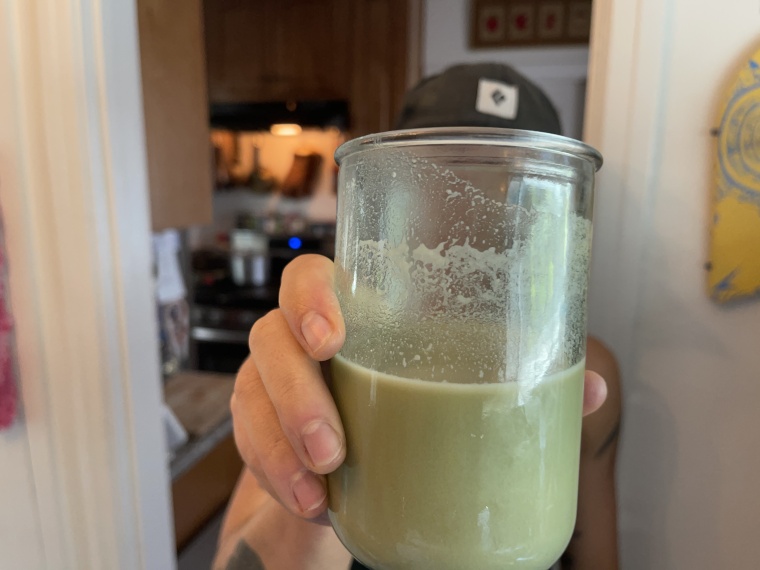
They also had this feedback in terms of the solubility of Truvani Protein Powder: “This mixed up surprisingly well. Not floaters at all. However, there were some caked-on leftovers on the bottom of my bottle after I finished the drink.”
What made Truvani Protein Powder not get a perfect score of 5 out of 5 for solubility? From Borchert: “The texture is a little gritty. While not unpleasant, it isn’t super smooth.” If you want a smoother, creamier end product, follow our Borchert’s suggestion and consider not mixing it with water: “I liked this much better with soy milk. Next time I need to froth up my milk to really feel like I spent 8 dollars at a coffee shop on a matcha drink, I’ll use this.”
Price Per Serving
The price per serving for Truvani Protein Powder is a bit steep compared to similar competitors (organic, vegan protein powders) at $3 per serving. You can get a 17% discount if you choose the auto-ship option, which brings the price per serving down to $2.50 — but that’s still more expensive compared to similar products.
Our product tester, BarBend editorial team member Rosie Borchert, has similar views on the price, which is one of its biggest drawbacks. They provided their opinion on the value of Truvani Protein Powder: “I’ll use the whole bag, for sure, but I’m not willing to pay the premium price for this protein powder.”
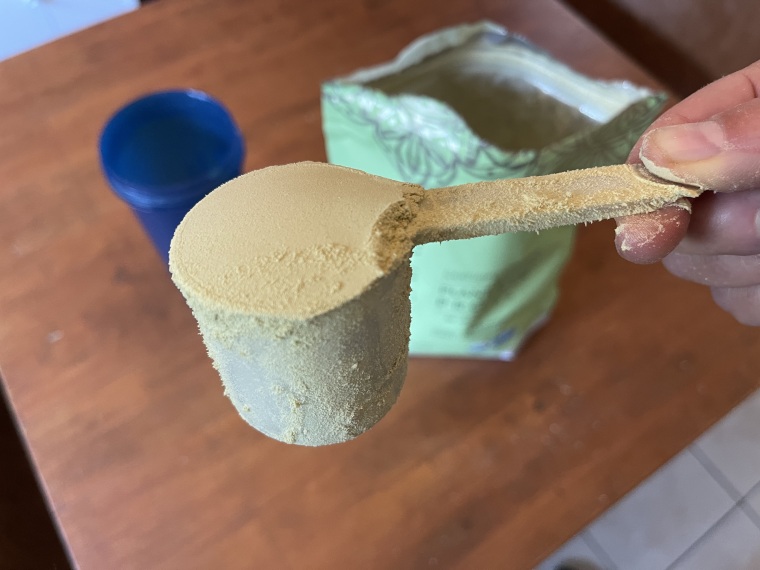
Borchert elaborates on the value of Truvani Protein Powder, saying: “I like to have two scoops of protein powder a day (it’s hard being mostly vegetarian), so I’d go through this in about 10 days. That’s six bucks a day! I prefer a protein powder with a larger amount of servings per container so I’m not constantly having to restock. Also, I hate this type of bagged protein — I’m always worried it’s going to topple over when I’m scooping — and without fail, I always make a mess.”
Third-Party Testing
Truvani Protein Powder is third-party tested, but the results of testing aren’t available to the consumer on their site. Because supplements aren’t regulated by the Food and Drug Administration (FDA), third-party testing helps to ensure levels of things like heavy metals are low enough to be considered safe.
Considering one of the founders of Truvani is Vani Hari (aka Food Babe), it’s a primary goal of the company to minimize the levels of trace metals and other contaminants in their products. While it’s impossible to completely eliminate traces of heavy metals (plants like peas take them up from the soil,) Truvani notes: “[A]ll our products are regularly tested for mercury, lead, cadmium, arsenic, and glyphosate. Not only that, each batch of each product is tested…We are committed to providing the highest quality products for our customers.”
What to Consider Before Buying Truvani Protein Powder
We’ve tested 100 different protein powders, both plant-based and whey protein-based. Several factors come into play when deciding if Truvani Protein Powder is a good fit for you.
- Cost: Truvani is one of the more expensive options, which is an important factor for many people to consider.
- Special diets: Unlike whey protein and the best soy protein powders, Truvani’s protein powder is suitable for special diets like paleo, soy-free, and milk-free diets.
- Protein content: The protein content of Truvani’s Organic Plant-Based Protein Powder is consistently around 20 grams per serving across all flavors.
- Sweetener: Not everyone will like the taste of sugar alternatives like monk fruit sweetener, so if you don’t like the taste you might consider the unflavored version.
Truvani Protein Powder Vs. Competitors
There are plenty of choices for plant-based protein powders on the market — how do you know how Truvani Protein Powder stacks up against the competition? We’ve got you covered with a direct comparison of similar products.
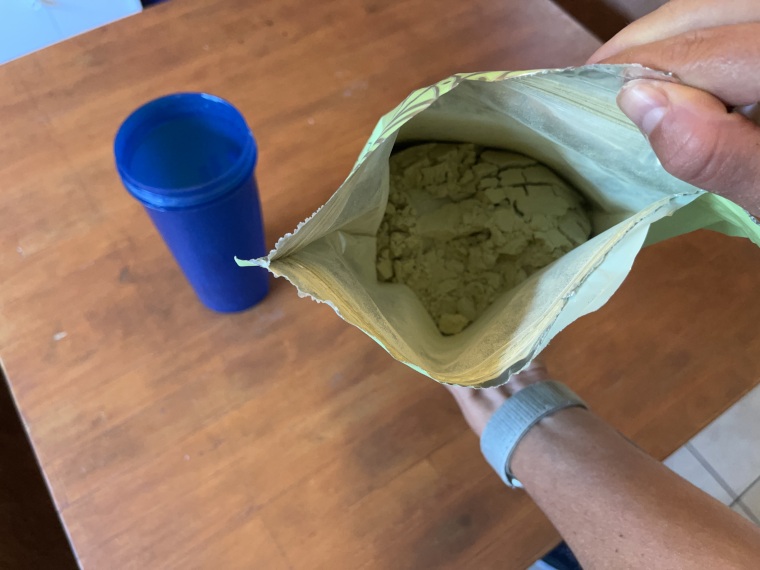
To give you a side-by-side view, we chose powders from Transparent Labs and Onnit, which both use pea protein and other vegan protein sources in their plant-based protein powders (similar to Truvani.) The biggest differences between the products are the flavor options (Truvani has the most options — both Transparent Labs and Onnit only have two flavors each) and price.
Check out our full Transparent Labs Organic Vegan Review.
| Truvani Protein Powder | Transparent Labs Organic Vegan | Onnit Plant-Based Protein | |
| Price Per Serving: | $3 | $1.67 | $2.25 |
| Protein Per Serving: | 20 g-21 g (depending on flavor) | 24 g | 20 g |
| Key Ingredients: | Organic Pea Protein, Organic Pumpkin Seed, Chia Seed Protein, Monk Fruit Extract (for flavored versions) | Organic Rice Protein, Organic Pea Protein Isolate, Organic Stevia | Pea Protein Concentrate, Pumpkin Seed Protein Powder, Sunflower Seed Protein Powder, Watermelon Seed Protein Powder, Avocado Oil Powder, Stevia |
| Calories Per Serving: | 100-150 (varies among flavors) | 130-140 | 100-110 |
| Flavors: | Chocolate, Vanilla, Banana Cinnamon, Chocolate Peanut Butter, Vanilla Chai, Peanut Butter, Unflavored/Unsweetened, Matcha, Lemon Cookie | Chocolate, French Vanilla | Vanilla, Chocolate |
| Third-Party Tested? | Yes | Yes | Yes |
A Note on Iron
Another thing to note with these plant-based protein powders is their iron content. Iron is a nutrient that helps build proteins in your red blood cells, which are responsible for transporting oxygen. Iron is one of the nutrients you’re more likely to be deficient in with a vegan diet.
Truvani Protein Powder contains 0% of the daily value for iron, while one serving of Transparent Labs Organic Vegan provides 25% of the daily value, and Onnit Plant-Based Protein provides 33% of the daily value for iron per serving.
The fact that Truvani Protein Powder doesn’t have any iron is a drawback when compared to Transparent Labs and Onnit. Some of the best protein powders for women are those that contain iron because women generally have higher iron needs. (Trans and nonbinary people should consult with a trans-affirming nutritionist or physician to get insight into their iron needs.)
Places to Buy Truvani Protein Powder
You can buy Truvani Protein Powder directly from their website, which offers a 17% discount if you order on autoship. Other online retailers where you can find Truvani Protein Powder include:
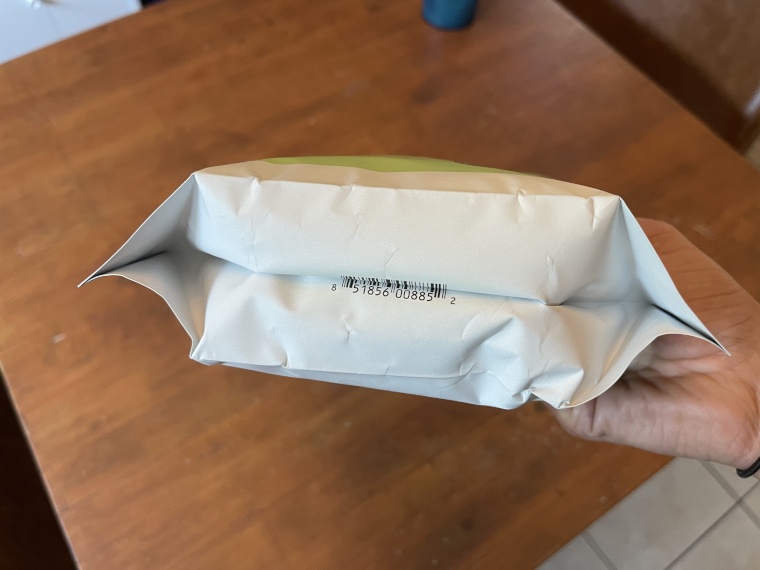
- Amazon
- The Vitamin Shoppe
- Whole Foods
- Professional Supplement Center
- myotcstore.com
Customer Experience and Brand Reputation
Truvani offers free shipping for orders over $65. According to their website, orders are usually fulfilled within 24 to 48 hours and delivered to addresses in the United States and Canada.
For their return policy, Truvani offers returns within the first 30 days of delivery if you’re unsatisfied, but you’ll be responsible for return shipping. However, this only applies to the first purchase of a product, and original shipping charges aren’t refunded.
Customer reviews on Truvani’s site are overall very positive, with many reviewers appreciating the simple and clean ingredients list, lack of additives and fillers, Truvani’s transparency, and the fact that the protein powder is well tolerated compared to other protein powders reviewers have used.
Our Final Verdict on Truvani Protein Powder
It’s no question that the ingredients in Truvani Protein Powder are simple with no fillers, binders, or artificial sweeteners. The protein content per serving is similar to other competitors and the variety of flavor options is a big plus. Our product tester and BarBend editorial team member Rosie Borchert appreciates the flavor and overall good solubility when using Truvani Protein Powder firsthand.
If money was no object, I’d definitely consider replacing my current protein powder with it — and that’s coming from a dietitian! However, the price per serving makes the cost a bit too steep for me given how often I use protein powder, and that might be the case for the general population, as well.
Truvani Protein Powder FAQs
How much does Truvani Protein Powder cost?
Truvani Protein Powder costs $3 per serving. It’s one of the pricier protein powders — part of the increased cost is likely from the use of organic ingredients, which tend to cost more than non-organic ingredients.
Why is there a Proposition 65 warning on Truvani products?
According to Truvani, there is a Proposition 65 warning on any of their products that contain foods with traces of heavy metals, such as lead from the peas in the protein powder. (Some foods have traces of heavy metals from the soil in which they are grown.) Truvani has their products third-party tested to demonstrate reduced traces of heavy metals as much as possible.
What do customer reviews say about Truvani Protein Powder?
Truvani Protein Powder has an average rating of 4.8 out of 5 from over 7,600 reviews on its site. Reviewers appreciate the simple ingredient list and the lack of additives and fillers, and rave about the taste. Some reviewers specifically note that Truvani Protein Powder doesn’t give them digestive upset like bloating.
Are there any artificial sweeteners or additives in Truvani Protein Powder?
Truvani Protein Powder uses monk fruit extract as a sweetener for its flavored versions. The unsweetened/unflavored version doesn’t contain any type of sweetener.
Other than the protein sources, the other ingredients used are to add flavor (e.g. organic spices, vanilla powder, cocoa powder, banana powder, etc.). MCT oil is also an ingredient in some of the flavors.
There aren’t any added fillers or binders such as maltodextrin or corn starch in any version of Truvani Protein Powder.
References
- Banaszek, A., Townsend, J. R., Bender, D., Vantrease, W. C., Marshall, A. C., & Johnson, K. D. (2019, January 4). The effects of whey vs. Pea Protein on physical adaptations following 8-weeks of high-intensity functional training (HIFT): A pilot study. Sports (Basel, Switzerland). https://www.ncbi.nlm.nih.gov/pmc/articles/PMC6358922/
- Shanthakumar, P., Klepacka, J., Bains, A., Chawla, P., Dhull, S. B., & Najda, A. (2022, August 22). The current situation of pea protein and its application in the Food Industry. Molecules (Basel, Switzerland). https://www.ncbi.nlm.nih.gov/pmc/articles/PMC9412838/
- Mohammed, S., & Qoronfleh , M. (n.d.). Seeds. Advances in neurobiology. https://pubmed.ncbi.nlm.nih.gov/32006367/
- Poggioli, R., Hirani, K., Jogani, V.G., & Ricordi, C. (2023). Modulation of inflammation and immunity by omega-3 fatty acids: A possible role for prevention and to halt disease progression in autoimmune, viral, and age-related disorders. European review for medical and pharmacological sciences. https://pubmed.ncbi.nlm.nih.gov/37606147/
- Khalid, W., Arshad, M. S., Aziz, A., Rahim, M. A., Qaisrani, T. B., Afzal, F., Ali, A., Ranjha, M. M. A. N., Khalid, M. Z., & Anjum, F. M. (2022, December 15). Chia seeds (salvia hispanica L.): A therapeutic weapon in metabolic disorders. Food science & nutrition. https://www.ncbi.nlm.nih.gov/pmc/articles/PMC9834868/
- W;, M. K. (2015). Effects of medium-chain triglycerides on weight loss and body composition: A meta-analysis of randomized controlled trials. Journal of the Academy of Nutrition and Dietetics. https://pubmed.ncbi.nlm.nih.gov/25636220/